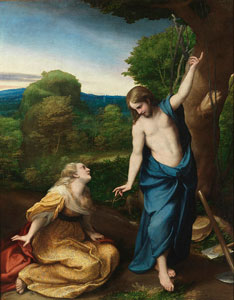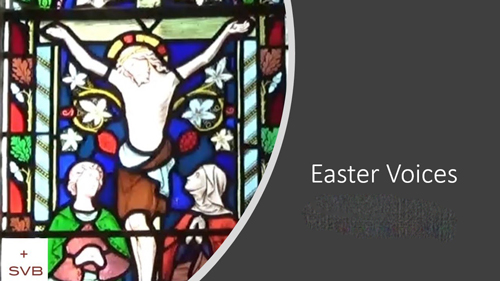
"Noli Me Tangere" (Touch Me Not) – Correggio (1534)
I.Theme – Easter celebrates the reality of Jesus’ resurrection in all its many aspects. Hope, Transformation, Evangelism and a new life.
John’s Gospel, one of the longer accounts of the Resurrection, shows the ability of the risen Christ to bring transformation and hope into the most difficult situations of human pain and grief is powerfully and movingly highlighted. With this encounter, John ‘leads the reader from the empty tomb to that which is the real meaning of the resurrection – the creation of a new relationship between Jesus and those who believe in him.’
By contrast, Mark’s account is the shortest. And in Mark’s account, not even the women, who faithfully come to the tomb on that first morning, go out to proclaim the good news–instead, they flee in terror and amazement, and say nothing to anyone (vs. 8). However, it should be noted and appropriate that the first witnesses to the Resurrection are women, who would not have been considered reliable witnesses at the time. It is a life changing event and one outside our normal expectations. The Resurrection is The Resurrection of Jesus, though foretold in the Gospels, was never expected or understood by the people closest to Jesus. It is something new, something amazing, something so wondrous that it takes a while for it to sink in.
The Corinthians reading is the oldest of all testimonies to our Lord’s resurrection from the apostle Paul. Indeed, the point at which 1 Corinthians 15 stands closest to the Gospels is the identification of Simon Peter (Cephas: verse 5) as among the first to whom the risen Lord appeared (cf. Mark 16:7; Luke 24:34; John 21:1-8). At this point, Paul’s list omits the most obvious part of all the gospel resurrection narratives, when his account is set next to them — where are the women? Paul’s writings precede the writing of the Gospels. It is historically impossible to know what kind of information Paul received from others about the resurrection. The point is that while Paul was late to the Church, Paul senses God’s presence and grace and that Jesus dies to save sinners for all.
![]() The Acts reading emphasizes the broader nature of the resurrection spreads the message of Christ to all and in particular the Gentiles. It is Peter’s missionary speech to Cornelius, a Gentile centurion, and his household. The conversion of Cornelius marks an important turning point in the understanding of God as impartial and consequently the outreach of the Church to Gentiles. Many “circumcised believers” (11:2) rejected and feared the possible inclusion of Gentiles in the Church, but Luke makes clear that Peter himself (even before Paul) began the mission to the Gentiles under the direction of the Holy Spirit (1:8) because his idea of God had changed.
The Acts reading emphasizes the broader nature of the resurrection spreads the message of Christ to all and in particular the Gentiles. It is Peter’s missionary speech to Cornelius, a Gentile centurion, and his household. The conversion of Cornelius marks an important turning point in the understanding of God as impartial and consequently the outreach of the Church to Gentiles. Many “circumcised believers” (11:2) rejected and feared the possible inclusion of Gentiles in the Church, but Luke makes clear that Peter himself (even before Paul) began the mission to the Gentiles under the direction of the Holy Spirit (1:8) because his idea of God had changed.
The Psalms speak to the type of life we receive in Christ.
1. In death to sin, self, and the world (v.3a; cf. 2:20; Rom. 6:6-11)
2. In spiritual resurrection to newness of life (v.1a; cf. 2:12-13; Rom. 6:6, 11)
3. In new, spiritual life, aliveness to God (vv. 3b, 4a; cf. Rom. 6:11, 13)
4. In resurrection glory (v.4b; cf. Rom. 8:17-18; 2 Thess. 1:10)
The lectionary readings are here or individually:
Old Testament – Isaiah 25:6-9
Psalm – Psalm 118:1-2, 14-24 Page 760, BCP
Epistle- Acts 10:34-43
Epistle- 1 Corinthians 15:1-11
Gospel John 20:1-18
Gospel – Mark 16:1-8
Read more





